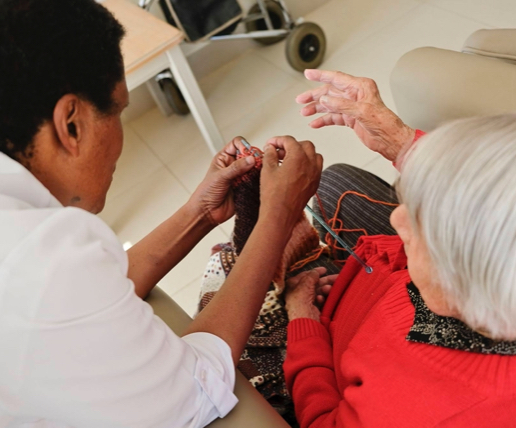
Many people are concerned about the onset of dementia as they age. While it’s natural to worry, it’s important to have all the facts in order to know what to expect and how to prepare. Take a look at these ten dementia myths and the truth behind them.



Myth #1: Dementia and Alzheimer’s Disease are the same thing
This isn’t quite true. Dementia is a general term used to describe a range of symptoms. There are as many as 60 different types of dementia, the most common of which is Alzheimer’s. Many types of dementia share certain symptoms, but the underlying causes of each is different. For example, Alzheimer’s is a result of plaques and tangles in the brain that cause brain cells to die. Vascular dementia is caused by a lack of oxygen due to an event such as a stroke.
This isn’t quite true. Dementia is a general term used to describe a range of symptoms. There are as many as 60 different types of dementia, the most common of which is Alzheimer’s. Many types of dementia share certain symptoms, but the underlying causes of each is different. For example, Alzheimer’s is a result of plaques and tangles in the brain that cause brain cells to die. Vascular dementia is caused by a lack of oxygen due to an event such as a stroke.
Myth #2: Everyone gets dementia as they age
This is not correct. While the likelihood of dementia increases as we age, it’s by no means a normal part of ageing. According to research, approximately 30% to 45% of seniors over the age of 85 are likely to develop some form of dementia.
This is not correct. While the likelihood of dementia increases as we age, it’s by no means a normal part of ageing. According to research, approximately 30% to 45% of seniors over the age of 85 are likely to develop some form of dementia.
Myth #3: Dementia is hereditary
While there is a genetic component to some forms of dementia, having a relative with dementia by no means implies that all other members of the family will get it too. However, if a parent or grandparent developed Alzheimer’s when they were younger than 65 years, the chance of it passing on genetically is higher.
While there is a genetic component to some forms of dementia, having a relative with dementia by no means implies that all other members of the family will get it too. However, if a parent or grandparent developed Alzheimer’s when they were younger than 65 years, the chance of it passing on genetically is higher.
Myth #4: Dementia only affects seniors
This is mostly but not entirely correct. In some rare cases, dementia can affect younger adults. Early onset dementia, between the ages of 30 and 65 years, is highly unlikely with just a 0.4% chance of occurrence.
This is mostly but not entirely correct. In some rare cases, dementia can affect younger adults. Early onset dementia, between the ages of 30 and 65 years, is highly unlikely with just a 0.4% chance of occurrence.
Myth #5: You can’t live a normal life with dementia
Luckily, this one isn’t true. The symptoms of dementia range from subtle to severe. This means that many people with a mild case of dementia require only slight changes to their lifestyle in order to continue living a meaningful and active life. Dementia is however a progressive disease, meaning that some greater lifestyle changes may become necessary as symptoms worsen.
Luckily, this one isn’t true. The symptoms of dementia range from subtle to severe. This means that many people with a mild case of dementia require only slight changes to their lifestyle in order to continue living a meaningful and active life. Dementia is however a progressive disease, meaning that some greater lifestyle changes may become necessary as symptoms worsen.
Myth #6: Being forgetful always signifies dementia
It’s no secret that memory loss can be an early sign of dementia (particularly Alzheimer’s Disease). But this isn’t always the case. Forgetfulness can simply be a result of stress, fatigue or a momentary lapse. Some types of dementia are more commonly signified by changes in mood and personality, language difficulties and decreased decision-making abilities.
It’s no secret that memory loss can be an early sign of dementia (particularly Alzheimer’s Disease). But this isn’t always the case. Forgetfulness can simply be a result of stress, fatigue or a momentary lapse. Some types of dementia are more commonly signified by changes in mood and personality, language difficulties and decreased decision-making abilities.
Myth #7: Dementia can always be prevented
Unfortunately, this is not true. Scientists have identified 12 risk factors that may increase the likelihood of developing dementia. These include:
Unfortunately, this is not true. Scientists have identified 12 risk factors that may increase the likelihood of developing dementia. These include:
- hypertension
- less education
- hearing impairment
- smoking
- obesity
- depression
- physical inactivity
- diabetes
- low levels of social contact
- alcohol consumption
- traumatic brain injury
- air pollution
Myth #8: Vitamins and supplements can prevent dementia
According to a number of studies, there is no strong evidence that this is true.
According to a number of studies, there is no strong evidence that this is true.
Myth #9: Everyone with dementia becomes aggressive
Changes in behaviour and mood, along with the frustration and confusion of dealing with other dementia symptoms can cause some seniors to respond with anger and irritability. But this is not the case for everyone. Proper pain management, compassionate care, a reliable daily routine, calm communication and a safe environment can significantly reduce the frustration and anger often suffered by dementia patients.
Changes in behaviour and mood, along with the frustration and confusion of dealing with other dementia symptoms can cause some seniors to respond with anger and irritability. But this is not the case for everyone. Proper pain management, compassionate care, a reliable daily routine, calm communication and a safe environment can significantly reduce the frustration and anger often suffered by dementia patients.
Myth #10: Dementia is not fatal
This is unfortunately false. Research in the US has shown that people aged 65 years and older live approximately four to eight years after being diagnosed with Alzheimer’s, while some live as long as 20 years. Dementia kills more people than breast cancer and prostate cancer combined.
This is unfortunately false. Research in the US has shown that people aged 65 years and older live approximately four to eight years after being diagnosed with Alzheimer’s, while some live as long as 20 years. Dementia kills more people than breast cancer and prostate cancer combined.
At Totalcare, we are fully equipped to provide the professional care, facilities and support dementia patients need to stay safe, healthy and comfortable. We currently manage eight retirement villages with assisted living and frail care units. Our residents are looked after by our national nursing services manager, nursing services manager, sisters, nurses and care workers. Residents also have access to a doctor, occupational therapist and support services. Our team will assess the needs of each resident to ensure they get the exact level of care they need throughout every stage of their life with dementia.
For more information, click here.
